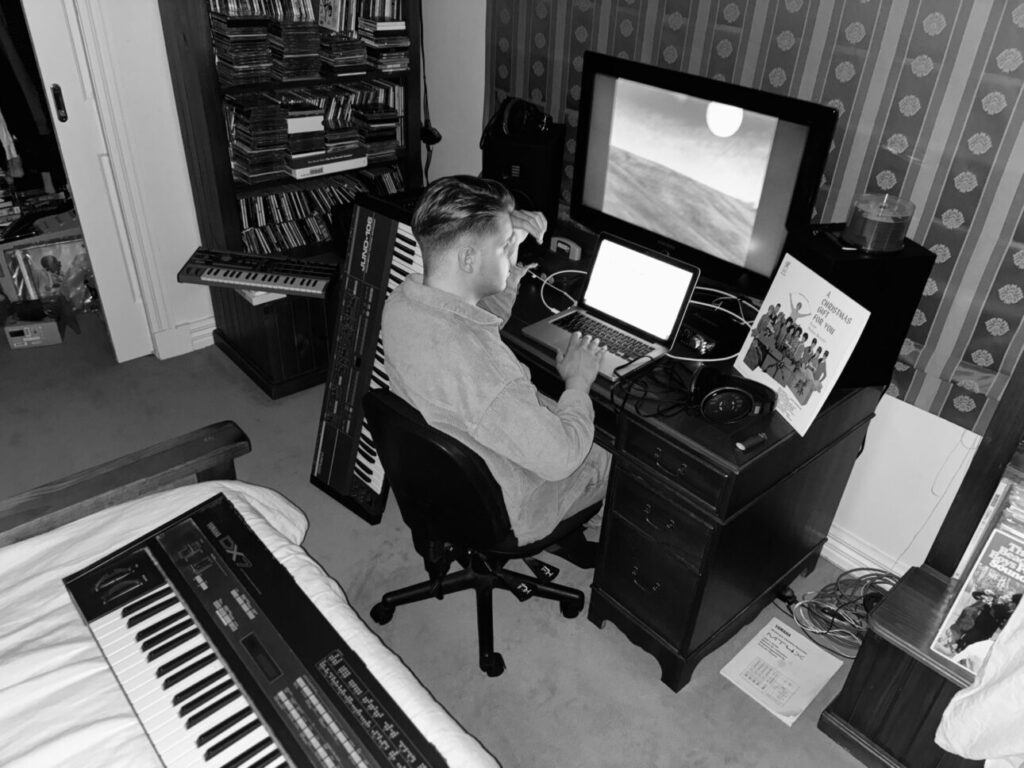“I remember my brother and I used to fill up a CD-R with songs and drive into the city. We could only pick one song each till the disc was full,” says Adam Kyriakou, who records under the name Department, over the phone from Melbourne (“the best city in Australia,” he quickly adds). “My brother (Tim) put ‘Hiders’ by (London-based electronic musician) Burial on there. I still get chills thinking about hearing it for the first time.”
The 26-year-old was already a fan of Burial but now sees that 2013 track as a point in the enigmatic London producer’s career that became a guidepost for his approach to creating music out of samples. “There was a period, I think around the Rival Dealer EP, when he was trying to write [conventional] songs more. And that impacted me deeply, because it was like, I can construct like a verse, chorus, bridge out of other people’s voices,” he says. “Everything came together for me after that moment. I knew exactly the music I needed to create. It was my ‘Brian Wilson hearing “Be My Baby” and pulling over the car’ moment.”
Department’s debut album Dumb Angel, self-released in September, builds on that epiphany with a maximalist collage that sometimes sounds like an unlikely all-star jam in an alternate universe. On “Dreams of Youth,” vocals from multiple Ariana Grande songs are mixed and matched in a virtual duet with Jason Pierce of Spiritualized. On “Distant Voices, Still Lives (Part II),” ‘90s R&B group 702’s vocals float over an early Parliament obscurity and the thumping beat from J-Kwon’s 2004 rap hit “Tipsy.”
Kyriakou, a student at La Trobe University in Melbourne, would enlist friends to add keyboards, strings, and 808 drums to flesh out songs and help connect the samples. “I would bring people in to play over samples without too much context,” he says. Like before, his brother Tim, who is seven years older, helped influence the shape of the record. “He helped me edit the album down in the final stages and was the only person I brought in to hear the final cuts because he knows exactly what I’m getting at with my music.”
‘60s nostalgia is Kyriakou’s unlikely muse for mixing and matching samples. The music he heard in his parents’ record collection as a child, including psychedelic pop confections by pioneering producers like Phil Spector and Joe Meek, inspired Department’s use of soaring voices and dramatic reverb. “All I’ve ever been chasing is that feeling of Odyssey & Oracle by the Zombies, Beach Boys’ Pet Sounds,” he says. “ I was like nine years old, on the internet, downloading Smile bootlegs, just kind of going down that rabbit hole.” Few of the samples on Dumb Angel are from the ‘60s, although Kyriakou samples the decade secondhand via “Ladies and Gentlemen We Are Floating in Space,” a 1997 Spiritualized track that interpolates Elvis Presley’s “Can’t Help Falling In Love.”
Kyriakou is aware of the history of plunderphonics, composer John Oswald’s term for music created out of pirated audio, and recognizes how artists and producers from Girl Talk to the Dust Brothers have creatively combined samples before. With melody as the driving force rather than rhythm, though, Department’s music hits on a more emotional level, and Dumb Angel is the rare electronic album where tracks are not locked into a consistent BPM. “There’s not one moment of the record that’s on a grid,” Kyriakou says.
Department shares a hometown with Australia’s most famous sample collage artists, The Avalanches. Kyriakou’s Brandy-sampling 2021 debut single “Fear of the Heavens” was mixed with Avalanches engineer Tony Espie. Kyriakou pulled that track off streaming services, however, as he considers revising it for a future project. “That was kind of maybe 70% there of what I wanted,” he says. “I do wanna revisit it because there’s so much material from this period where it was really good or great but just didn’t fit with [Dumb Angel]. “That’ll probably be the next thing that I do.”

The album was largely recorded while Kyriakou was a student living at home with his family during the COVID-19 lockdown. “I’ve been pretty much in my room for the past two or three years, I barely left my house. You can’t make a record like that on a clock, you just can’t,” he says. The songs were first sketched out on entry-level open-source audio software, Audacity, and then finalized on Ableton, with occasional distortion and clipping deliberately left in the tracks to preserve the album’s raw homemade origins.
Of course, Kyriakou realizes he’s in a tenuous position using pieces of so many other people’s records, but he didn’t think about it while creating. “I think the second you start putting limitations on artistry, you kind of don’t end up making the record you want to. This record wouldn’t exist if I was sitting there like, ‘I can’t do this, I can’t do that.’”
Kyriakou’s larger long-term ambition, however, is to work with vocalists instead of just sampling them. “I wanna work with singers or rappers and push my kind of sound into records for other people,” he says. “I wanna try and do what they were doin’ in the’60s, even as [recently] as Timbaland, making weird, interesting, really colorful pop records.”
